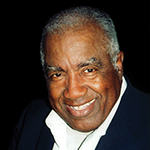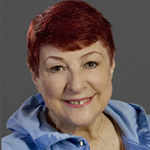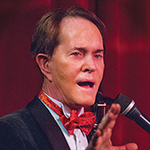Ronny Whyte
Genteel, Urbane Jazzman
June 6, 2018
By Alix Cohen for Cabaret Scenes
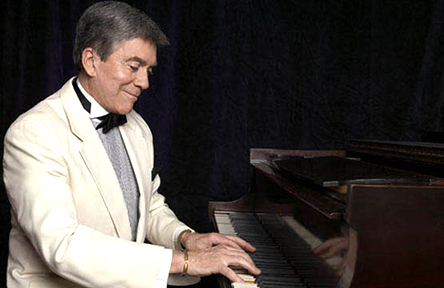
There are few entertainers who still exude the kind of style and taste associated with the glory days of nightclubs, hotel performance rooms, and classy piano bars. Ronny Whyte is unquestionably one, yet his start couldn’t have been further from the late nights and sophistication of the city.
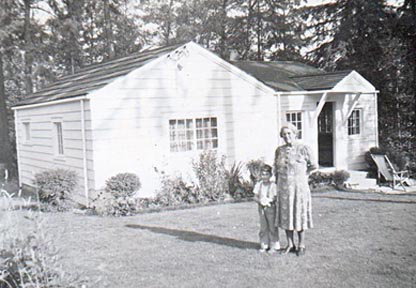
Whyte spent his first six years in a Seattle log cabin in the back woods built by his father. No kidding. (Later, siding covered the logs.) On his way to the outhouse, he’d pet the deer. Mr. Whyte, Sr. was then a milkman. He’d take the boy on his route. The family moved to a second, self-built home when it was time for Ronny to attend school. Next, Mr. Whyte, Sr. owned gas stations. Learned skills? Nope. Ronny “can’t pound a nail in straight” and is “terrible with cars.” He cooks and gardens.
“As soon as I could speak, my mother had me singing. She played the piano.” At eight years old, Ronny begged for and took two years of classical piano lessons. Though, even as a child, his ear was sharp enough to imitate what he heard on the radio, the boy wanted to be able to read music. His father preferred pop and stride. Whenever his father was home, Ronny switched his practice routine. Raised an ambivalent Mormon, he also played organ at a neighboring Baptist Church.
“My parents went dancing every Saturday night almost to the end. On their 50th anniversary, I wrote “They Danced Through Life Together” and flew them to New York for my opening at the St. Regis. Don Smith (Donald Smith, then publicist, eventual creator of The Mabel Mercer Foundation) gave a party for them. Kay Swift, who was Gershwin’s girlfriend, was there, Bobby Short, Rex Reed…” A long way from the woods.
He said, “May I have this dance?
She thought, “I’m taking a chance,
But he’s tall and handsome and worth a glance”
And that was the start of it all.
Teenaged Whyte acted and sang in musical theater productions. His high school voice teacher had coached Constance Towers and knew Richard Rodgers. Theirs was the first high school to be allowed to stage Carousel. He played Mr. Snow.
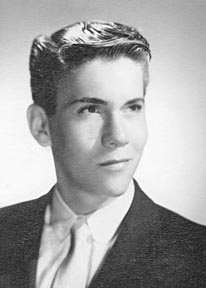
The famously dapper musician owned only his chorister blue blazer and grey slacks. Jeans were forbidden back then. Girls wore skirts. When his mother began to shop at a branch of Marshall Fields, Whyte would go along, with his allowance and money earned working in libraries. “I was developing a taste for the finer things.”
After graduation, mercifully between wars, Whyte enlisted in the Air Force securing a place in the dance band. That meant playing not only piano, but “garbage percussion”: cymbals, triangle, castanets, bass drum…(no vocals). He spent four years in New England. At one point, having trouble with his hands, the musician left base on Saturdays to study the Tobias Matthay Technique. “A lot of jazz guys use it… a way of play, release, play, release. You strike the keys putting your whole body behind it.”
Someone Whyte was dating back home sent him a subscription to The New Yorker. He read that and The Atlantic Monthly cover to cover…learning, feeling an affinity. The young serviceman would train to New York regularly. “It cost a dollar or two if you were in uniform. Grand Central Station used to have lockers and showers. I’d bring my clothes, leave my uniform in a locker for several days, and do the town. It was magical.”
He stayed at The Algonquin Hotel, apparently cheap back then. He hung out on jazz capital’s 52nd Street and would go to three or four Broadway or Off-Broadway shows in a weekend. “I saw Elaine Stritch and Don Ameche in Goldilocks (Jean and Walter Kerr/Leroy Anderson/Joan Ford), which was fall-out-of-your-seat funny, and Ethel Merman in Happy Hunting. (Later, Whyte and Travis Hudson would sing “Everyone Who’s ‘Who’s Who'” from this.)
“Most of my salary went to a bank in New York so, when I came, I didn’t have to worry.” Discharged, Whyte tried out for Juilliard, but, having been offered a scholarship, decided instead to spend a year at The American Theatre Wing. The aspiring actor/vocalist auditioned with “I’m in Love with Miss Logan” (Robert Clary; New Faces of 1952) and a speech by Sakini from Teahouse of The August Moon: “Lovely ladies, kind gentlemen, let me introduce myself—Sakini by name, interpreter by profession…,” he spontaneously recites. Never challenge a Whyte memory. “We got passes to everything and I’d go to cattle call auditions.”
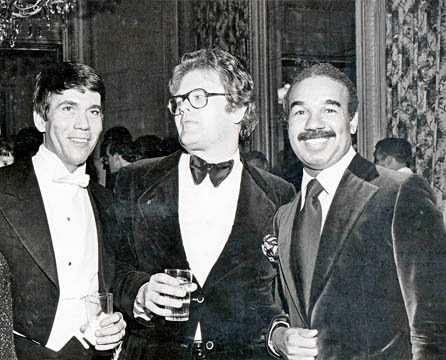
(Courtesy of photographer Helen Marcus)
One of his first major influences and lifelong friends was the iconic Bobby Short. Short was a revelation to young Ronny Whyte who never imagined having a career both singing and playing. “We started chatting at Arpeggio. Next thing we were having lunch. ‘I’ve succeeded because I’m a freak,’ Bobby told me, ‘I never act like I’m colored, nor do I use any Negro mannerisms.’
“Bobby performed with enormous energy and panache and put himself together impeccably. He taught me how to dress, how to build a following with a mailing list (before email) and that, if you’re performing at night, you must nap in the afternoon.”
In 1956, fledgling talent agent Irvin Arthur bought a “forty-four seat hole-in-the-wall that faced the Blue Angel on 55th Street” (Intimate Nights by James Gavin) called R.S.V.P. for $1,750. Arthur installed Mabel Mercer with pianist Sam Hamilton. His wife was cashier. A regular some years later, Whyte asked whether he could audition for Arthur and was told the owner tended bar there weekend afternoons. He played and was asked to come in and sign a contract at the Broadway office.
“So I go in with a portfolio of two or three photos and a bunch of lies…and there’s this brunette behind his front desk. ‘Hi, I’m Ronny Whyte. Irvin said I should come by,’ I said. ‘Ronny Whyte?! Where have you been?!’ she screeched, ‘We’ve been looking all over for you!’ I said, ‘That can’t be,’ and she said, ‘I thought I’d make you feel good.’ That woman was Joan Rivers. We became friends for life.”
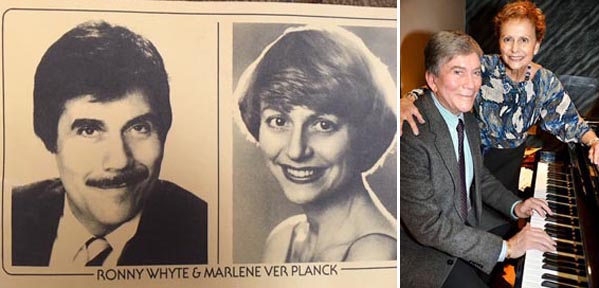
Whyte performed at The Showplace on West 4th Street seven hours a night, developing a following. His then-manager booked him out of town as much as possible because gigs were scarce here. “I was breaking even.” He met Marlene VerPlanck (who became another enduring friend) when they shared the win of a talent contest at Trude Heller’s Versailles. “She had an extraordinary voice and a good sense of how to deliver a lyric, while swinging in a jazz vein. Most singers can’t do both. Her sound and demeanor were joyous.”
Frequenting Heller’s on breaks from his own job, he also connected with Bob Dorough, Teddy Wilson, and Blossom Dearie. “There are no degrees of uniqueness; you’re either unique or not. She was adorable, low-key, and played such tasty piano.” He laughs. “Meeting people was easy then.”
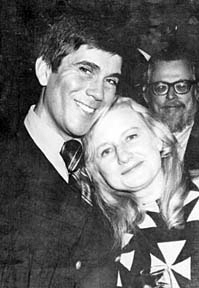
(Photo: Christian Steiner)
Whyte was playing clubs and performing in industrials. The period also included an appearance on Ed Sullivan with the cast of a Jan Wallman revue called The New York Coloring Book: Ronnie Hall, Carol Morley, and Gloria Bleezarde. Opportunity for career impact was, unfortunately, lost to scheduling. The quartet was booked on the last night of their show.
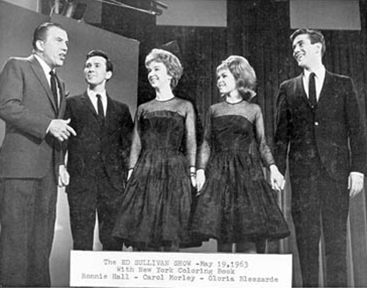
Two years of summer stock in New Hampshire and one in Maine found Whyte playing Pal Joey (easy to imagine) as well as “straight” roles in Noël Coward (replete with British accent), Tennessee Williams and Ionesco plays. (In 1984, Whyte briefly went back on stage in New London as a lead in They’re Playing Our Song. He almost ended up in the tour.) “If someone asked me to audition today, I’d do it, but no one thinks of me that way.”
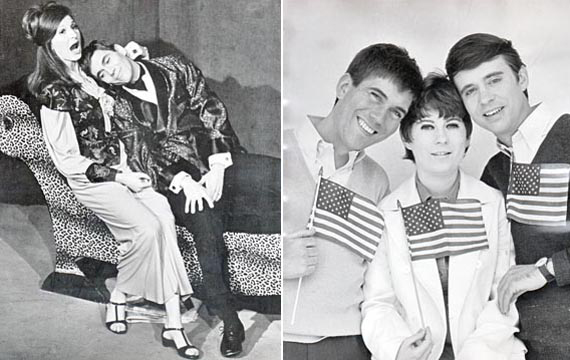
(Right) Ronny, Elizabeth Courtney, Bailey Davis in The Star-Spangled Girl”
At 24, he was hired to do a Dupont Industrial and earned his Equity Card. Six months later, he landed at the company’s World’s Fair pavilion. “I was trying to keep away from the piano so people would think of me as an actor.” It was an enormous undertaking, a show that played in three shifts of four hours a day. “We were playing with Freon, the stuff that destroyed the atmosphere. It was fun. We had white uniforms. Everyone was young and cute.”
DU PONT
Show business and science are artfully combined in this big, circular pavilion. A musical revue called Wonderful World of Chemistry…is presented simultaneously in two theaters by two casts of performers. After the show is over, audiences watch a modern-day alchemist perform feats of wizardry through chemistry.
Around then, Whyte met Charles DeForest at The Apartment on 2nd Avenue. “He was a fine performer, very dramatic. Charles wrote lots of songs which were published by George Shearing. I used to fill in for him when he went on vacation.” In fact, Whyte filled in all over town for years, almost becoming the successor to Bobby Short—for whom he also substituted—at Café Carlyle.
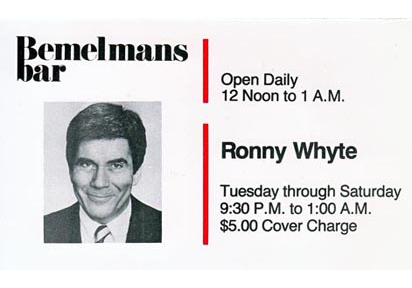
A regular at The Hickory House across from Birdland, he also struck up acquaintances with Billy Taylor and Don Shirley. Whyte told them he planned to go back to Seattle and get a teaching degree to have something to fall back on. “Everybody said, ‘Ronny, do that and we’ll never see you again. If you really want to be in this business, just stay here and do it.’ And they were right.”
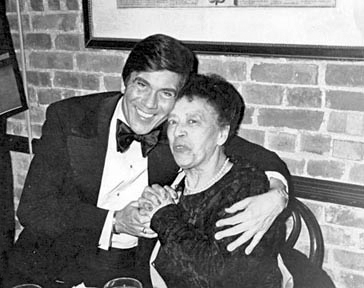
(Photo: CJ Zumwalt)
Someone brought Mabel Mercer (another major influence) in to hear Travis Hudson and Ronny at Ramondo’s on 58th Street. “She sent people to see me; a lovely person—if sometimes grand.” They didn’t become close till much later. Towards the end of Mercer’s life, Whyte would go up to Old Chatham, New York to visit. He produced a series of concerts dedicated to her at The Spencertown Academy there. Frail as she was, Mercer came to every show, attending every after-party. One night after an intimate dinner, Whyte asked whether she’d like to sing. “She said, ‘Oh yes!’ So I played and we did a couple of Cole Porter songs. I’m the last person to ever play for her.”
That summer, Travis was away doing stock and Whyte was alone at Ramondo’s. George Wein’s righthand man, Charles Bourgeois, came in with a French woman who offered the musician a job in Paris. Whyte spoke French, but had never been abroad, and jumped at the chance. He successfully played six months in the City of Light, but decided his future lay back in the states and returned. “French doesn’t swing.” Meanwhile, Ramondo’s had changed hands. The Sherry-Netherland and Bemelmans Bar at The Carlyle Hotel followed.
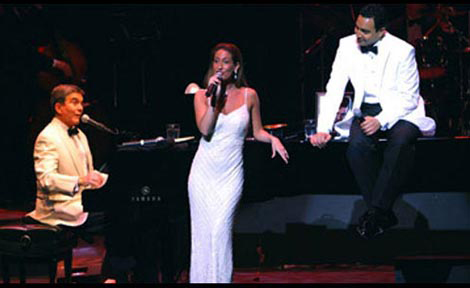
Whyte was at Danny’s Piano Bar “long enough to work through my then repertoire of 700 songs” when producer Jack Lewin asked whether he’d step into Our Sinatra. Eric Comstock was leaving the flourishing revue he’d created with Hilary Kole and Christopher Gines. The new cast began with two months in Boca Raton. “Eight shows a week a block from the beach,” he recalls, smiling. Next year they took it on the road with a big band. Whyte was bandleader. “I made sure I got out in front of the piano. I even danced. It was great fun. We did 60 cities in two months.” He still performs in the indomitable show several times a year.
“Our Sinatra is probably Ronny Whyte’s night. Ronny is such a deft performer, nothing escapes him. He has a definitive style, impeccable phrasing, and a most pleasing voice. On top of that, he’s eternally young.” — Gary Stevens, syndicated columnist
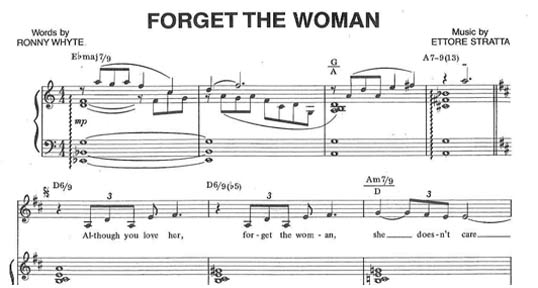
Tony Bennett used to come in to hear the artist at The Mayflower. One night, at the piano, Whyte sang a song called “Forget the Woman” he’d written with Ettore Stratta. “I wrote the last line first: ‘She has forgotten you.’ Tony recorded it on his Art of Excellence album. He asked me to send more stuff and I did, but his son sent them back as unsolicited.” He emits a small sigh.
He’s been writing since his early twenties, both music and entire songs. (He also authored two full shows that never saw the light.) These days, Whyte’s own Cornelia Street Publishing handles the oeuvre. “If I have an idea, I’ll write a lyric, but I write for Sinatra, Bennett, Ray Charles—that kind of song. No one’s interested today….our music is just not what’s going down.” A cache of six LPs and 14 CDs remain with Audiophile. “I pay for the master. No one makes any money.”
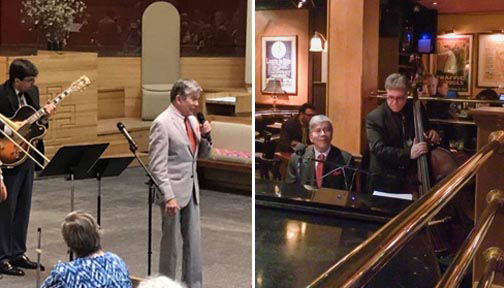
(Right) At The Knickerbocker with Boots Maleson
In 2006, Whyte took over the already 40-year-old Midday Jazz at St. Peter’s Church at 619 Lexington Avenue. “It was started by Edmund Anderson who wrote the lyric for “Flamingo.” He knew Duke Ellington. We have the [Billy] Strayhorn piano because of him. Dear man, lovely person.” The church’s atmosphere and acoustics lend themselves well to his bang-for-the-buck program. “It’s not for profit, but also not for loss. We just need to break even.”
Whyte intermittently performs at Birdland, North Square brunches, The Knickerbocker, Kitano, or an out-of-town gig in the evening. He tries to play every day, practices singing, goes to the gym four times a week, and occasionally travels further than his Jersey City or Milford homes.
“Ronny’s debonair exterior conceals a lot of old-fashioned hard work. His concerts are not merely planned, they’re planned in exquisite CALLIGRAPHY. And he sings in at least a half-dozen languages. When he worked Monday nights at Danny’s, you’d ask for a song and, in the unlikely event he didn’t feel ready to perform it, you knew damn well it would be up and running the next week. He started out a jazz-oriented saloon singer playing top cabarets, but has become a world-class jazz musician.” — Eric Comstock
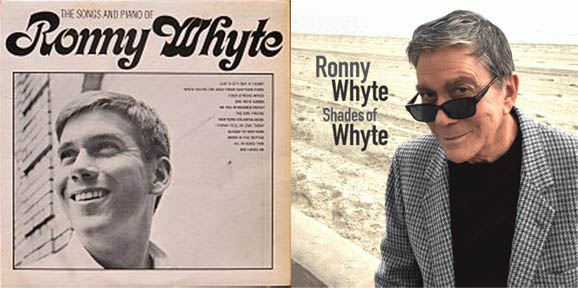
Sophistication, urbanity, worldliness, cool—these words often describe someone jaded, uncaring, egocentric. Not true of Ronny Whyte. Manners are respectful, not slick, consideration inbred, loyalty essential, work ethic disciplined. Values are those learned before Whyte hit the big city. Even the avowed egotism of early ambition has vastly diminished over time.
After 37 years in the same wonderful relationship, only Pushkin the dog waits for Ronny Whyte at home. Never let it be said he’s not social, however. As a zippy, new, blue convertible attests, this is a man who fully enjoys life. He’s healthy, present, self-aware, and grateful.
“I live in the past. I’m very happy there.”
Visit: www.ronnywhyte.com



